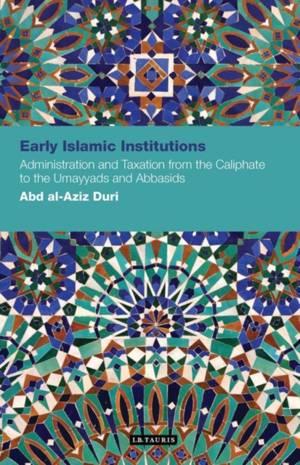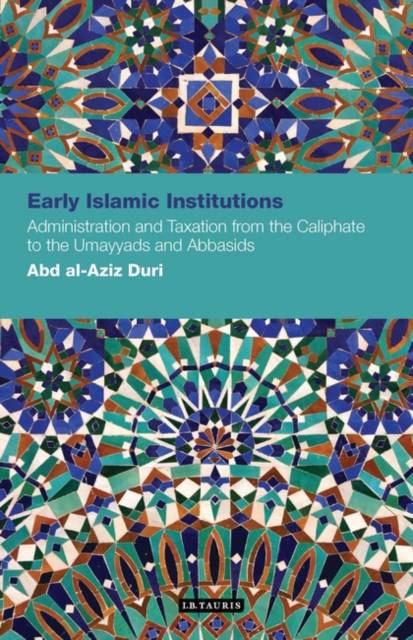
- Retrait gratuit dans votre magasin Club
- 7.000.000 titres dans notre catalogue
- Payer en toute sécurité
- Toujours un magasin près de chez vous
- Retrait gratuit dans votre magasin Club
- 7.000.0000 titres dans notre catalogue
- Payer en toute sécurité
- Toujours un magasin près de chez vous
Early Islamic Institutions
Administration and Taxation from the Caliphate to the Umayyads and Abbasids
Abd Al-Aziz Duri
72,95 €
+ 145 points
Description
The rapid expansion of the early Islamic world is conventionally ascribed to a combination of perceptive military leadership and religious fervour. By looking at the administration and taxation which would be implemented by political rulers, Abd al-Aziz Duri demonstrates how these leaders were able to provide for growth, development and durability in a turbulent time, as well as efficient mechanisms for taxation and tax collection. Drawing on original research into the fiscal policies of this period, especially land tax and the tax on non-Muslim populations, Duri shows how different models evolved and renewed themselves. He examines the political systems that accompanied these fiscal regimes, and attitudes towards them. He also scrutinises the institutions which supported this remarkably coherent mode of governance, offering a new perspective on the relationship between politics and Islam in this formative period.
By looking at these early Islamic institutions, Duri makes the argument that due to persistence of such organization, from the early Muslim conquests and the later Umayyad era to the end of 'Abbasid rule, the leaders of the time can be seen to be particularly politically and organizationally skilled. Duri's work makes a major contribution to our understanding of how Islam established itself and flourished as a lasting major force in the development of world history.
Abd al-Aziz Duri (1919-2010) was Professor of History at the University of Jordan, having previously served as President of Baghdad University from 1963 to 1968. Among the most influential of his books on early Islam are The Economic History of Iraq in the Fourth Century AH (1948), An Introduction to the History of the Dawn of Islam (1949), and The Early Abbasid Period (1988), as well as treatises on Arab nationalism such as The Historical Roots of Arab Nationalism (1960) and The Historical Formation of the Arab nation: A Study in Identity and Consciousness (1987).
By looking at these early Islamic institutions, Duri makes the argument that due to persistence of such organization, from the early Muslim conquests and the later Umayyad era to the end of 'Abbasid rule, the leaders of the time can be seen to be particularly politically and organizationally skilled. Duri's work makes a major contribution to our understanding of how Islam established itself and flourished as a lasting major force in the development of world history.
Abd al-Aziz Duri (1919-2010) was Professor of History at the University of Jordan, having previously served as President of Baghdad University from 1963 to 1968. Among the most influential of his books on early Islam are The Economic History of Iraq in the Fourth Century AH (1948), An Introduction to the History of the Dawn of Islam (1949), and The Early Abbasid Period (1988), as well as treatises on Arab nationalism such as The Historical Roots of Arab Nationalism (1960) and The Historical Formation of the Arab nation: A Study in Identity and Consciousness (1987).
Spécifications
Parties prenantes
- Auteur(s) :
- Editeur:
Contenu
- Nombre de pages :
- 232
- Langue:
- Anglais
- Collection :
Caractéristiques
- EAN:
- 9781780766485
- Date de parution :
- 17-11-14
- Format:
- Livre broché
- Format numérique:
- Trade paperback (VS)
- Dimensions :
- 155 mm x 231 mm
- Poids :
- 317 g

Les avis
Nous publions uniquement les avis qui respectent les conditions requises. Consultez nos conditions pour les avis.






